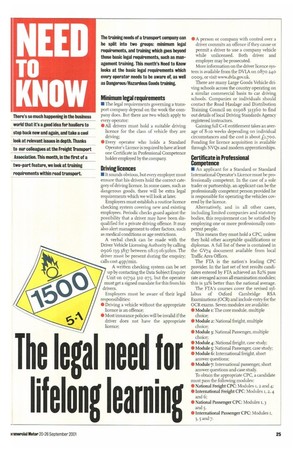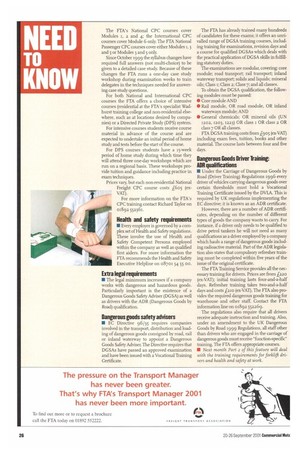The legal need for lifelong leart
Page 25

Page 26

If you've noticed an error in this article please click here to report it so we can fix it.
The training needs of a transport company can be split into two groups: minimum legal requirements, and training which goes beyond those basic legal requirements, such as management training. This month's Need to Know looks at the basic legal requirements which every operator needs to be aware of, as well as Dangerous/Hazardous Goods training.
Minimum legal requirements
• The legal requirements governing a transport company depend on the work the company does. But there are two which apply to every operator: • All drivers must hold a suitable driving licence for the class of vehicle they are driving; • Every operator who holds a Standard Operator's licence is required to have at least one Certificate in Professional Competence holder employed by the company.
Driving licences
• It sounds obvious, but every employer must ensure that his drivers hold the correct category of driving licence. In some cases, such as dangerous goods, there will be extra legal requirements which we will look at later.
Employers must establish a routine licence checking system covering new and existing employees. Periodic checks guard against the possibility that a driver may have been disqualified for a private driving offence. It may also alert management to other factors, such as medical conditions or age restrictions.
A verbal check can be made with the Driver Vehicle Licensing Authority by calling 0906 139 3837 between o 8:15-16:3ohrs. The driver must be present during the enquiry; calls cost 49p/rnin.
A written checking system can be set up by contacting the Data Subject Enquiry Unit on 01792 310 075, but the operator must get a signed mandate for this from his drivers.
Employers must be aware of their legal responsibilities: • Driving a vehicle without the appropriate licence is an offence; • Most insurance policies will be invalid if the driver does not have the appropriate licence; • A person or company with control over a driver commits an offence if they cause or permit a driver to use a company vehicle while unlicensed, Both driver and employer may be prosecuted.
More information on the driver licence system is available from the DVLA on 0870 240 0009, or visit www.dyla.gov.uk.
There are many Large Goods Vehicle driving schools across the country operating on a similar commercial basis to car driving schools. Companies or individuals should contact the Road Haulage and Distribution Training Council on 01908 313360 to find out details of local Driving Standards Agency registered instructors.
Gaining full C+F entitlement takes an average of 8-To weeks depending on individual circumstances and the cost is about ii,7oo. Funding for licence acquisition is available through NVQs and modern apprenticeships.
Certificate in Professional Competence
• An applicant for a Standard or Standard International Operator's Licence must be professionally competent. In the case of a sole trader or partnership, an applicant can be the professionally competent person provided he is responsible for operating the vehicles covered by the licence.
Alternatively, and in all other cases, including limited companies and statutory bodies, this requirement can be satisfied by employing one or more professionally competent people.
This means they must hold a CPC, unless they hold other acceptable qualifications or diplomas. A full list of these is contained in the GV74 document available from local Traffic Area Offices.
The FTA is the nation's leading CPC provider. In the last set of test results candidates entered by FTA achieved an 82% pass rate averaged across all examination modules; this is 32% better than the national average.
The FTA's courses cover the revised syllabus of Oxford Cambridge RSA Examinations (OCR) and include entry for the OCR exams. Seven modules are available;
• Module I: The core module, multiple choice; • Module 2: National freight, multiple choice; • Module 3: National Passenger, multiple choice; • Module 4: National freight, case study;
• Module 5: National Passenger, case study;
• Module 6: International freight, short answer questions; • Module 7: International passenger, short answer questions and case study
To obtain the appropriate CPC, a candidate must pass the following modules:
• National Freight CPC: Modules I, 2 and 4; • International Freight CPC: Modules 1, 2,4 and 6; • National Passenger CPC: Modules I, 3 and 5.
• International Passenger CPC: Modules /, 3, 5 and 7.
The FTA's National CPC courses cover Modules r, 2 and 4; the International CPC courses cover Module 6 only. The FTA National Passenger CPC courses cover either Modules 1, 3 and 5 or Modules 3 and 5 only.
Since October i99 9 the syllabus changes have required full answers (not multi-choice) to be given to a detailed case study. Because of these changes the FTA runs a one-day case study workshop during examination weeks to train delegates in the techniques needed for answering case study questions.
For both National and International CPC courses the FTA offers a choice of intensive courses (residential at the FTA's specialist Wadburst training college and non-residential elsewhere, such as at locations desired by companies) or a Directed Private Study (DPS) system.
For intensive courses students receive course material in advance of the course and are expected to undertake an initial period of home study and tests before the start of the course.
For DPS courses students have a r5-week period of home study during which time they will attend three one-day workshops which are run on a regional basis. These workshops provide tuition and guidance including practice in exam techniques.
Prices vary, but each non-residential National Freight CPC course costs £605 (exVAT).
For more information on the FTA's CPC training contact Richard Taylor on or892 552361.
Health and safety requirements
• Every employer is governed by a complex set of Health and Safety regulations. These involve the use of Health and Safety Competent Persons employed within the company as well as qualified first aiders. For more information the FTA recommends the Health and Safety Executive Helpline on 08701 54 55 00.
Extra legal requirements
• The legal minimum increases if a company works with dangerous and hazardous goods. Particularly important is the existence of a Dangerous Goods Safety Adviser (DGSA) as well as drivers with the A DR (Dangerous Goods by Road) qualification.
Dangerous goods safety advisers
• EC Directive 96/35 requires companies involved in the transport, distribution and loading of dangerous goods consigned by road, rail or inland waterway to appoint a Dangerous Goods Safety Adviser, The Directive requires that DGSAs have passed an approved examination and have been issued with a Vocational Training Certificate.
The FTA has already trained many hundreds of candidates for these exams; it offers an unrivalled range of DGSA training courses, including training for examinations, revision days and a course for qualified DGSAs which deals with the practical application of DGSA skills in fulfilling statutory duties.
The examinations are modular, covering: core module; road transport; rail transport; inland waterway transport; solids and liquids; mineral oils; Class I; Class 2; Class 7; and all classes.
To obtain the DGSA qualification, the following modules must be passed: • Core module AND • Rail module, OR road module, OR inland waterways module; AND General chemicals; OR mineral oils (UN 1202, 1203, 1223) OR dass r OR class 2 OR class 7 OR all classes.
FTA DG SA training costs from £905 (ex-VAT) including exam fees, tuition, books and other material. The course lasts between four and five days.
Dangerous Goods Driver Training: UR qualifications III Under the Carriage of Dangerous Goods by Road (Driver Training) Regulations 1996 every driver of vehicles carrying dangerous goods over certain thresholds must hold a Vocational Training Certificate issued by the DVLA. This is required by UK regulations implementing the EC directive; it is known as an AD R certificate.
However, there are a number of ADR certificates, depending on the number of different types of goods the company wants to carry. For instance, if a driver only needs to be qualified to drive petrol tankers he will not need as many qualifications as a driver employed by a company which hauls a range of dangerous goods including radioactive material. Part of the ADR legislation also states that compulsory refresher training must be completed within five years of the issue of the original certificate.
The FTA Training Service provides all the necessary training for drivers. Prices are from f220 (ex-VAT); initial training lasts four-and-a-half days. Refresher training takes two-and-a-half days and costs plc, (ex-VAT). The FTA also provides the required dangerous goods training for warehouse and other staff. Contact the FTA information line on 01892 552269.
The regulations also require that all drivers receive adequate instruction and training. Also, under an amendment to the UK Dangerous Goods by Road 1999 Regulations, all staff other than drivers who are engaged in the carriage of erous goods must receive "function-specific" training. The FTA offers appropriate courses.
• Next month Part 2 of this feature will deal with the training requirements for forklift drivers and health and safety at Work.




































































































































